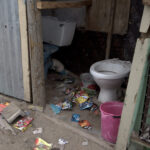A deal brokered with the health department guarantees free access but for how long?
Drugmaker Otsuka Pharmaceutical won’t charge South Africa for using its new tuberculosis (TB) drug in a pilot programme, but South Africa’s free deal is unlikely to last.
The drug, delamanid, is one of the first new TB medicines to be developed in 50 years. In unpublished research by international humanitarian organisation Doctors Without Borders (MSF) delamanid has been shown to cut drug-resistant TB treatment times by two-thirds when used in combination with existing remedies, says MSF advocacy and communications officers in Swaziland Zanele Zwane.
Current treatments for drug-resistant TB can take up to two years and patients have to take handfuls of pills daily that put them at risk of deafness or psychosis. More than half of patients with the most extreme form of drug-resistant TB, also known as extensively drug-resistant TB, will die, according to University of Cape Town studies.
Otsuka communications director Mark Destito has confirmed that a consignment of delamanid for 200 patients is on its way to South Africa. This shipment will kick off a health department programme to pilot the treatment among a small number of patients. The drug regulator, the Medicines Control Council, approved the pilot programme in January. The initiative will collect more data on the medicine’s safety and could lead to widespread use of delamanid.
Otsuka’s move comes after almost a year of negotiations between the health department and the Japanese firm. It may also pave the way for future discussions about the price of the drug, which currently sells for about R430 000 for a six-month course.
A similar pilot between 2012 and 2015 allowed South Africa to introduce the drug bedaquiline for drug-resistant TB.
Currently, delamanid is not approved for use and doctors wishing to prescribe it must apply to the council for permission to use it on a per-patient basis.
Norbert Ndjeka, the national health department’s director of drug-resistant TB, says delamanid will be available to selected patients at eThekwini’s King Dinuzulu Hospital Complex, Sizwe Tropical Disease Hospital in Johannesburg and Tshepong Hospital in Klerksdorp in the North West. It will also be given to patients at Cape Town’s Brooklyn Chest Hospital in collaboration with MSF. The international humanitarian organisation is also treating patients in Swaziland with delamanid.
MSF had previously demanded that Otsuka Pharmaceutical donate medicine for South Africa’s pilot project, which is also known as a clinical access programme. Although Destito has confirmed that his company will provide free drugs for the initiative, he maintains the pharmaceutical firm has a strict policy against donations.
He explained: “Otsuka does not support the idea of donating medicine since this is an unsustainable solution.”
If the drug is approved for use, the health department will have to negotiate a price for delamanid with Otsuka. Globally, 45 countries are using the medicine as part of national treatment programmes, says Destito.
International initiative to increase access off to a slow start
Globally, the drug remains expensive and few people are using it. According to Destito, a six-month course of Delamanid retails for about R430 000 a patient. In October, MSF estimated that only 405 people globally were using delamanid; Otsuka says this number is closer to 2 100 patients.
To expand access to its product, Otsuka agreed in February to provide the medicine at a reduced price of about R22 000 a patient using a global drug-purchasing mechanism run by the international organisation, Stop TB Partnership.
As part of this agreement, countries that receive money from international health financing body the Global Fund to Fight Aids, TB and Malaria are eligible for the special price, which is about 95% less than delamanid’s original price.
Swaziland’s ministry of health has already procured delamanid for its national TB treatment programme through this agreement. The country diagnoses 200 cases of multidrug-resistant TB each year. Access to the drug is important for children with drug-resistant TB because other treatments can be especially toxic.
Destito says some countries with large TB epidemics have not yet applied for access. “We are not seeing the expected trend in applications from countries where there is a large need for delamanid. There’s been large uptake in Kazakhstan, but it seems other countries where the burden is high are still assessing their next move.”
Update, 9 March 2017: This article has been amended. Due to a misunderstanding, the article previously quoted Destito as saying that Kryzygstan had seen a large uptake of delamanid. This is incorrect. Kazakhstan, not Kryzygstan, has placed large orders for the drug.
Joan van Dyk was a health journalist, senior health journalist and news editor at Bhekisisa between 2017 and 2023.




